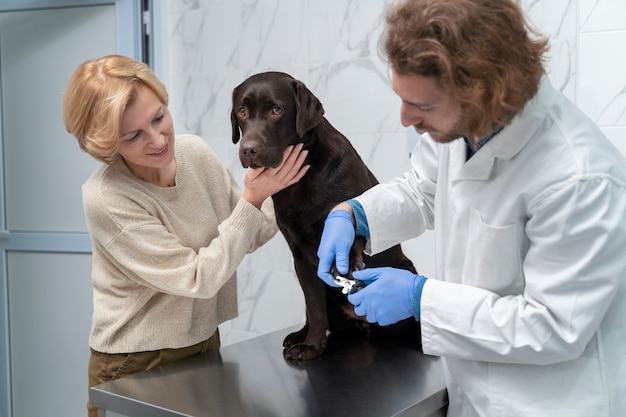Wellness Strategies to Support Cancer Prevention in Dogs and Cats


Wellness Strategies to Support Cancer Prevention in Dogs and Cats
Caring for your dog or cat means more than providing love and daily essentials; it also means being proactive about their long-term health. Cancer is a leading health concern for pets, especially as they age, and many pet owners in Coral Springs and surrounding communities want to know what they can do to help reduce their pet’s cancer risk. At Veterinary Cancer Health, located at 4101 Turtle Creek Drive, Coral Springs, FL, our specialty oncology team is dedicated to empowering you with practical wellness strategies for cancer prevention in pets. This blog explores actionable cancer prevention tips, including nutritional support, early screening, and ongoing monitoring, so you can confidently partner with veterinary oncology experts for your pet’s best possible future.
If you are searching for a trusted oncology vet near me or want to understand more about pet oncology wellness in Coral Springs, you are in the right place. Our commitment to advanced diagnostics, compassionate care, and ongoing support means your pet benefits from the latest in veterinary cancer prevention and early detection. In the following sections, we will guide you through recognizing risks, understanding causes, exploring professional preventive strategies, and knowing when to seek specialty care.
Recognizing Cancer Risks and Early Signs in Your Pet
Every pet parent wonders when a change in their dog or cat’s behavior or appearance should raise concern. Early detection is crucial in cancer prevention for pets, and knowing the signs helps you respond promptly. Many cancers in dogs and cats share subtle, easily overlooked symptoms. These include persistent lumps or swellings, unexplained weight loss, reduced appetite, ongoing fatigue, or changes in bathroom habits. Other signs to watch for are wounds that do not heal, difficulty breathing, lameness, or visible discomfort. While these symptoms do not always indicate cancer, they signal that your pet may need a professional evaluation.
It is also important to be aware of your pet’s breed and age-related risks. Certain breeds are more prone to specific cancers, and risk increases as pets grow older. For example, large-breed dogs may be more susceptible to bone cancers, while some cat breeds face higher rates of lymphoma. Recognizing these predispositions helps you work with your veterinary team to develop a proactive plan. If you notice any persistent or unusual changes in your pet, seeking a wellness pet examination in Coral Springs can provide peace of mind and guide next steps.
Understanding the Causes: Why Cancer Develops in Dogs and Cats
Cancer arises from a complex interplay of genetic, environmental, and lifestyle factors. In pets, just as in people, cancer occurs when abnormal cells grow uncontrollably and evade the body’s natural defenses. Genetic predispositions play a significant role; some breeds inherit a higher likelihood of certain cancer types. Age is another major factor, since cells accumulate genetic mutations over time, making cancer more common in senior pets.
Environmental exposures also contribute. Chronic exposure to tobacco smoke, pesticides, or certain chemicals may increase cancer risk. Additionally, diet and body weight matter; pets carrying excess weight may face higher rates of some cancers, likely due to the effects of long-term inflammation in the body. Hormonal status is another consideration. Pets that are not spayed or neutered may have higher risks of reproductive cancers, though the decision to spay or neuter should always be made in partnership with your veterinarian, considering all health factors.
Because many risk factors are outside our control, focusing on what can be managed is essential. Creating a safe home, offering high-quality nutrition, and scheduling regular veterinary screenings are all meaningful steps. For pet owners searching for oncology veterinarian near me, understanding these risk factors is the first step in building a comprehensive wellness plan.
Professional Strategies for Cancer Prevention and Early Detection
Preventing cancer in pets starts with a partnership between you and a veterinary oncology team. At Veterinary Cancer Health, our approach to cancer prevention for pets in Coral Springs centers on advanced diagnostics, screening, and ongoing monitoring tailored to each pet’s unique risks.
Advanced Cancer Screening and Diagnostics
Routine veterinary checkups are foundational to early cancer detection. During a comprehensive pet exam, our oncology professionals assess your pet’s overall health, palpate for lumps, check lymph nodes, and discuss any concerning changes you have noticed. For pets with higher risk or suspicious findings, we may recommend advanced diagnostics such as ultrasounds, digital radiographs, or even a CT scan to obtain detailed images of internal organs and tissues.
If a mass or abnormality is identified, our team may proceed with specialized tests like biopsy and cytology, which involve collecting cells for microscopic examination. For even greater diagnostic precision, we offer DNA sequencing and molecular analysis to characterize tumors at the molecular level. These services enable our veterinary team to not only diagnose cancer but also determine the best course of action, supporting both treatment and preventive care.
Ongoing Monitoring and Wellness Programs
Cancer prevention is not a one-time event; it is an ongoing commitment to your pet’s wellness. Our oncology team recommends scheduling regular screenings and wellness exams, especially for senior pets or breeds with known cancer risks. During these visits, we may perform routine bloodwork and urinalysis to detect subtle health changes before symptoms appear.
For pets with a history of cancer or those undergoing maintenance therapy, ongoing cancer care and monitoring ensures that any recurrence or new issues are identified early. This vigilant approach allows for timely interventions and gives pet owners confidence that they are doing everything possible to support their pet’s long-term health.
Home Wellness Strategies for Reducing Cancer Risk
While genetics and age cannot be changed, there are many steps you can take at home to support your pet’s wellness and potentially reduce cancer risk. Nutrition is a powerful tool; feeding a balanced, high-quality diet that meets your pet’s unique needs helps maintain a healthy weight and supports immune function. Ask your veterinary team for recommendations tailored to your pet’s age, breed, and lifestyle.
Limiting exposure to known carcinogens is another important step. Avoid using tobacco products around your pet and minimize their contact with lawn chemicals, pesticides, or other environmental toxins. For outdoor pets, providing shaded areas and limiting sun exposure can help prevent skin cancers, especially in pets with light-colored coats.
Regular exercise supports a healthy weight and promotes overall vitality, helping to counteract inflammation. At home, monitor your pet for new lumps, bumps, or changes in behavior, and keep a record to share with your veterinary oncology team during checkups. Consistent dental care also plays a role, as chronic oral inflammation can be linked to systemic health issues.
Finally, consider your pet’s emotional wellness. Chronic stress may affect immune health, so maintaining a stable, enriching environment with regular routines fosters both physical and psychological well-being. For pet owners researching pet oncology wellness near me or cancer prevention for pets in Coral Springs, these practical home strategies are a meaningful complement to professional veterinary care.
When to Seek Veterinary Oncology Care
Knowing when to transition from home monitoring to professional evaluation can be challenging. You should always seek veterinary care if your pet develops a persistent lump, unexplained weight loss, ongoing appetite changes, or any symptom that does not resolve within a few days. If you notice wounds that fail to heal, visible discomfort, or difficulty breathing, prompt assessment by a veterinary professional is critical.
Pets with a family history of cancer, breeds with higher risk, or those already diagnosed with benign tumors may benefit from earlier or more frequent screenings. Our oncology professionals at Veterinary Cancer Health collaborate closely with primary care veterinarians to ensure seamless communication and the best outcome for your pet.
If you are searching for an oncology vet near me or need a second opinion on a concerning finding, we encourage you to connect with our team. Early involvement of a veterinary oncologist can make a significant difference in treatment options and outcomes, giving your pet the best chance at a long, healthy life.
Taking the Next Step: Partnering with Veterinary Cancer Health for Your Pet’s Wellness
Supporting your pet’s cancer prevention requires a blend of awareness, proactive care, and partnership with a specialty veterinary team. By recognizing early signs, understanding risk factors, and embracing preventive wellness strategies—both at home and through regular veterinary visits—you are taking important steps toward safeguarding your pet’s future.
At Veterinary Cancer Health, our commitment is to provide the most advanced pet oncology wellness in Coral Springs and surrounding communities. Whether you are seeking comprehensive cancer screenings, ongoing monitoring, or simply want guidance on wellness strategies, our veterinary oncology professionals are here to support you. If you have questions or concerns about cancer prevention for pets, or if you are looking for an oncology vet near me, we encourage you to reach out for a consultation.
Call our Coral Springs clinic at (195) 459-28504 or visit us at 4101 Turtle Creek Drive, Coral Springs, FL to schedule a wellness pet examination or learn more about our ongoing cancer care and monitoring services. Together, we can give your pet the best chance for a healthy, cancer-free life in Coral Springs and beyond.
This article is for informational purposes only and is not a substitute for professional veterinary advice. If your pet is showing signs of illness or you have concerns about cancer risk, please consult with a veterinary professional.

.png)
















